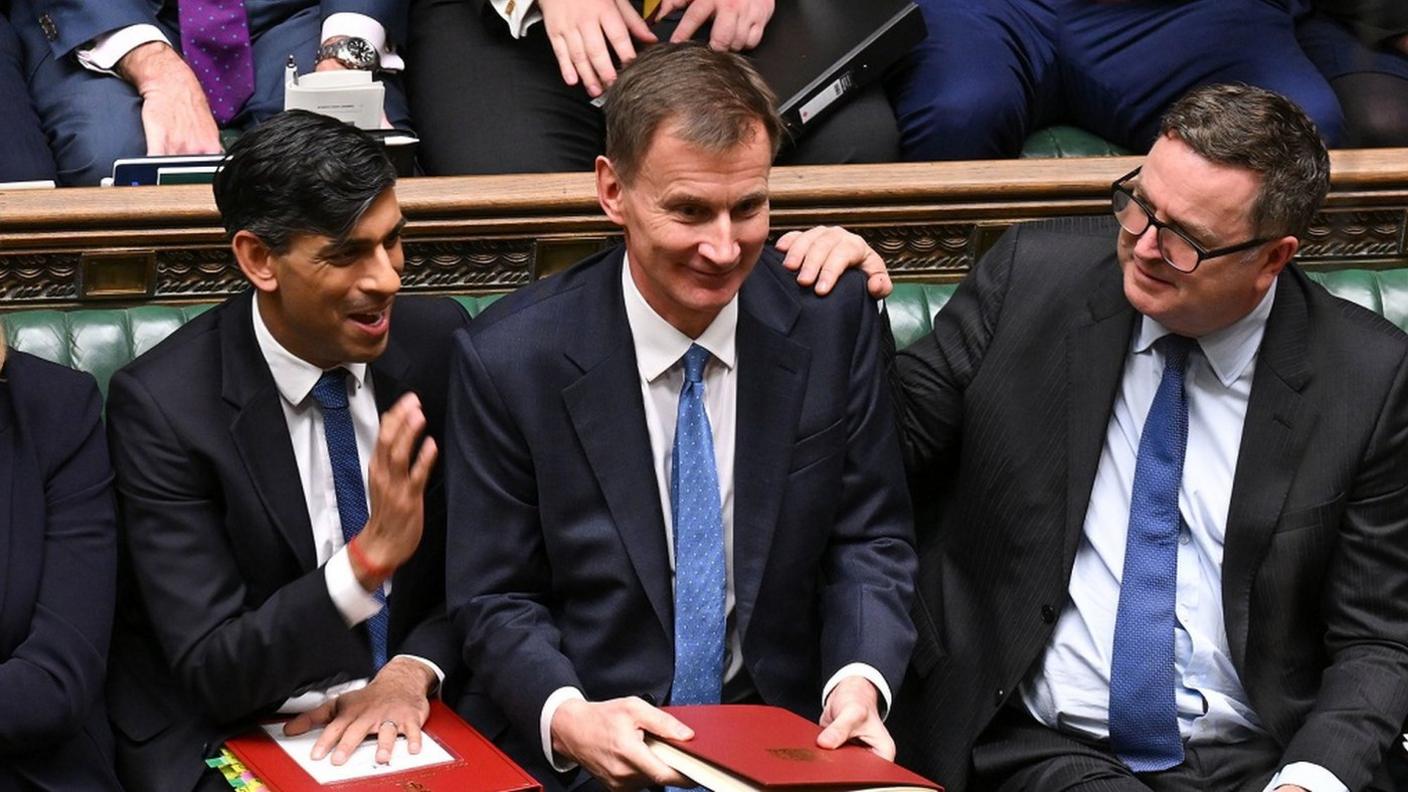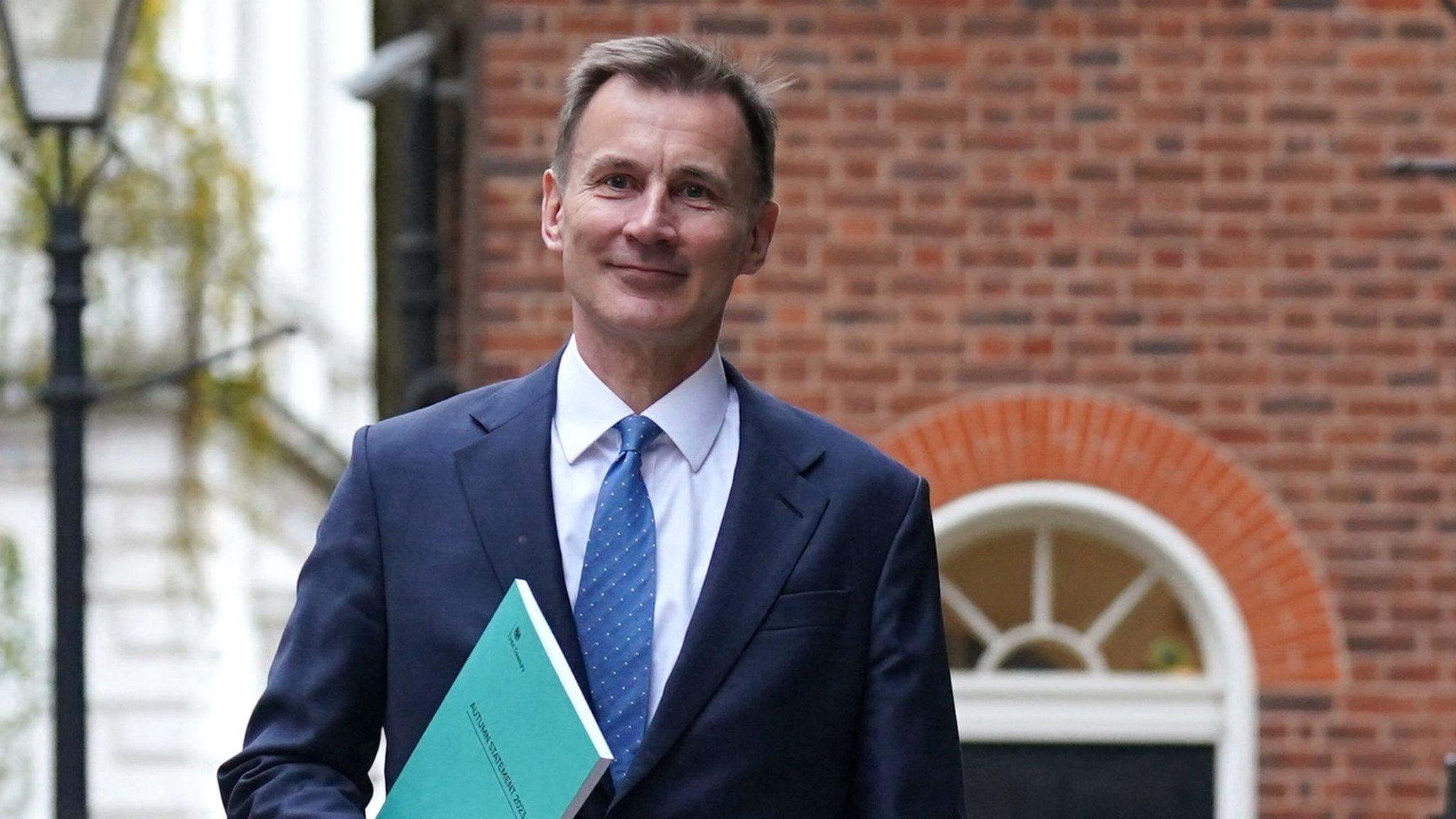Chris Mason: Three things really matter in Autumn Statement
- Published

Amid the hurricane of numbers and blizzard of words in the Autumn Statement, just three things really matter: Living standards, the tax burden, and tax cuts.
The government sought to sail the statement on a breeze of rhetoric about tax cuts, from the prime minister down.
And, yes, they were flagged prominently and proudly in Jeremy Hunt's words.
He acknowledged too - in my interview with him - his political inheritance: The pandemic, as well as support paying our energy bills that shot up after Russia invaded Ukraine.
Each were huge and rare moments of colossal state intervention which the Conservatives argue were pragmatic, sensible and widely supported ideas - but ones that were going to have deep and long-lasting impacts on the public finances.
And then there is the current economic picture, which is sluggish.
Let's take a look at each of those three things I mentioned, in turn.
Firstly, living standards.
Here is what the Office for Budget Responsibility said about them: "Living standards, as measured by real household disposable income per person, are forecast to be 3.5% lower in 2024-25 than their pre-pandemic level."
This, the OBR adds, isn't as bad as they had previously forecast (and does underline how forecasts can and do change - and change significantly), but "it still represents the largest reduction in real living standards since Office for National Statistics records began in the 1950s."
Graphs and rhetoric, spreadsheets and spin can't alter this.
So what about the tax burden, and tax cuts?
Again, let's look at what the OBR has to say.
The tax cuts will reduce the tax burden, compared to if the tax cuts hadn't happened, as you might expect.
But there's a twist.
"Tax changes in this Autumn Statement reduce the tax burden by 0.7% of GDP, but it still rises in every year to a post-war high of 37.7% of GDP by 2028-29."
GDP is gross domestic product, or national income.
And the principal reason the tax burden is continuing to grow, albeit at a slower rate, is the thresholds at which people start paying tax on their income, or start paying a higher rate, have been frozen - as inflation has soared.
So millions of people have been dragged into paying a higher rate of tax, without the government doing anything.
Our economics editor Faisal Islam has written about this here.
It prompts an interesting thought about what makes news and what doesn't.
When governments (or opposition parties) choose to do something by changing something, like putting up or cutting taxes, that makes news.
But the decision to opt for inaction, rather than action - which still involves a decision - doesn't so easily make news.
And yet that decision, at repeated Budgets, has a huge impact.
"By 2028-29, frozen thresholds result in nearly four million additional workers paying income tax, three million more moved to a higher rate and 400,000 more paying the additional rate," says the OBR.
The higher rate is charged at 40% on income just over £50,000 a year.
The additional rate is charged at 45% on income of a little over £125,000 a year.
All of this provides Labour with an easy target, right now.
But the most bleak of inheritances if they win the next general election.
Labour say they agree with the tax cuts in the Autumn Statement and they are not outright rejecting other measures in there either.
And they share a diagnosis with the Conservatives about what is at the root of so many of the UK's contemporary challenges: A lack of growth.
Trying to caffeinate a listless, lethargic economy is what the Autumn Statement is attempting to do.
And the opposition would face the same, grinding challenge in power themselves, if they get the chance.
Related topics
- Published23 November 2023
